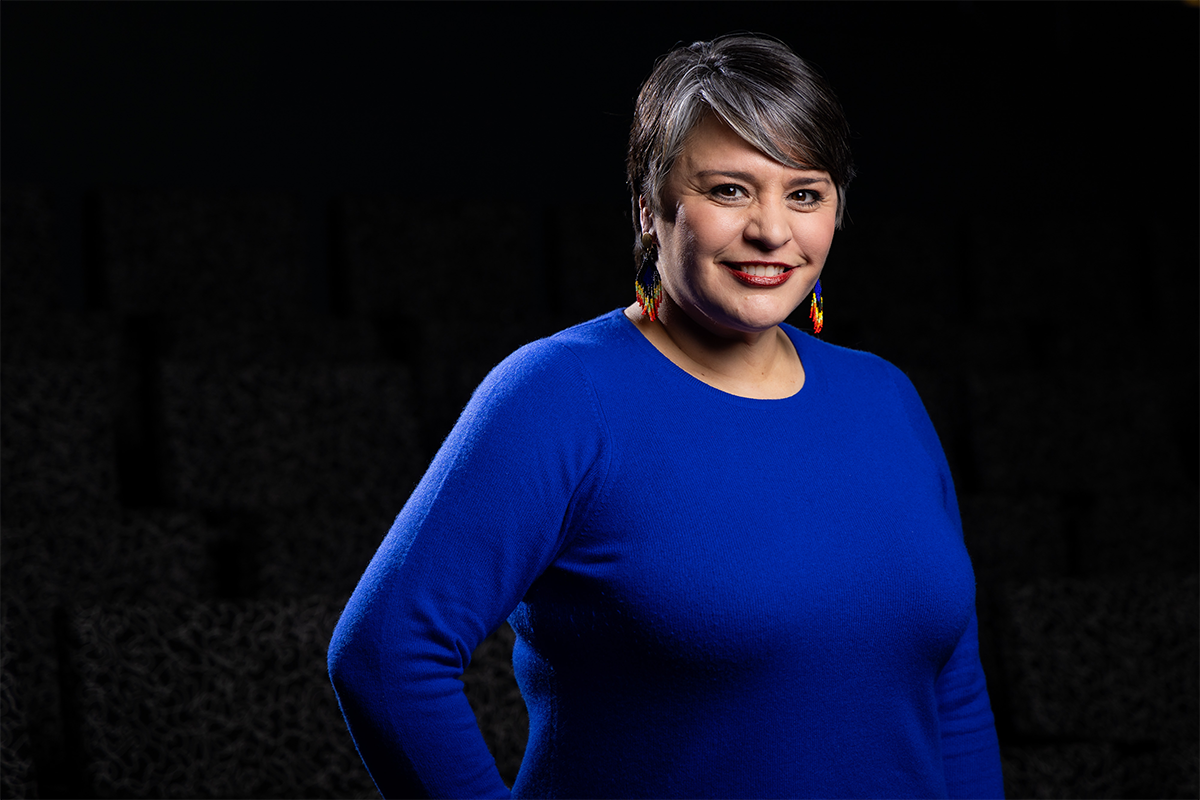 (Photo by Jeff Carrion/DePaul University)
(Photo by Jeff Carrion/DePaul University)A trained theatre artist, actor and voice coach, Michelle Lopez-Rios joined The Theatre School at DePaul University as an associate professor in 2016 and took on the role of artistic director of Chicago Playworks in 2020. She has an academic and professional history in theatre for young and Latinx audiences, which she notes has influenced most of her work as an artist. Lopez-Rios also brings this experience to her position on DePaul’s Hispanic Serving Institution Task Force.
In this conversation, Lopez-Rios chats with Newsline about diversity in the arts, its importance for young audiences and what the Hispanic Serving Institution designation at DePaul would mean for the broader campus community.
For those who aren’t familiar, can you tell us a little about Chicago Playworks at The Theatre School?
Founded as the Goodman Children’s Theatre in 1925, Chicago Playworks is recognized as a pioneer of theatre for families and is dedicated to reflecting Chicago audiences’ experience in an urban, contemporary and multi-racial environment.
Theatre for young audiences has evolved across the country in the last 10 to 20 years, and that evolution is really mirrored in Playworks. What makes us unique is that as an educational institution, we often commission brand new works, rather than adaptions or existing plays. Not many theatres do that -- most commission works they know ‘will sell.’ We also strive to find pieces created by Chicago playwrights or even DePaul alum to better connect with our audiences. So Playworks is also exciting in that sense.
Why is diversity in the arts important?
We just closed our fall production, ‘The Mole Hill Stories’ by Alvaro Saar Rios, a bilingual play exploring fables from Peru, Mexico and the Seneca people. It’s a very physical piece, with both Spanish and English languages spoken. The kids in our audience were enraptured.
Based on research, we know kids who engage with performance arts have expanded perspective on life, have hope and better thinking. We also know representation matters. When kids see people like themselves on stage, they see potential and possibility. When creative juices are flowing, they can imagine a better world and how they see themselves in that world.
What role does Playworks and diversity in the arts play for the DePaul community?
Playworks’ tradition and legacy is huge and a wonderful asset to the university and to Chicago, but even more so for the DePaul students who work on these productions. Students always come out the other end understanding how impactful theatre and diverse representation are. We recently had a Theatre student work on a play who also sat in the audience of a Playworks piece when he was young, and said it was the coolest full-circle experience.
DePaul is working to become a designated Hispanic Serving Institution. What would that status mean for the campus community?
Again, we know representation matters. Chicago’s population is around 27 or 28 percent Latinx. DePaul’s student population is just under 20 percent Latinx, and the full-time faculty cohort is even smaller. So, we are not representative of our broader community.
As a task force we are in the beginning stages of conversations, but we are focusing on all students’ needs – careers services, commuter student needs, mental health, veteran services and more. Gaining HSI status would mean a bit more funding, but it isn’t always about the actual money. The conversations are centered around what we can do with our students already on campus and how we can best support them during their time at DePaul.
When we strive to take care of the most vulnerable in our population, when we think and act smartly and compassionately about vulnerable populations, everyone benefits.
Rachel Wojnicki is a contributor to Newsline.